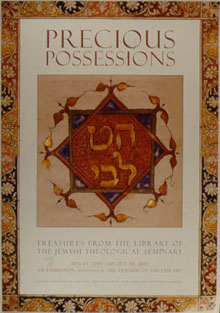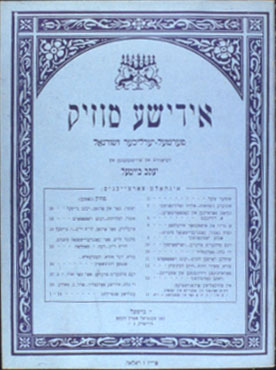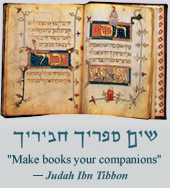Between the Lines
Vol. 16, No. 1
- Library Receives Prestigious Andrew W. Mellon Foundation Grant
- The Pearl Siegel Library Judaica Book Fund Established
- Precious Possessions: Treasures From The Library of the Jewish Theological Seminary
- Traveling Exhibitions
- Friends of The Library Publish Jewish Calendar 5762
- Rothschild Mahzor Travels to Jerusalem
- ALEPH 500 in Operation
- Cantor Jacob Beimel Collection Donated to The Library
Library Receives Prestigious Andrew W. Mellon Foundation Grant
The library is the proud recipient of a $474,000 grant from the Andrew W. Mellon Foundation. The Mellon Foundation is a private, non-profit enterprise dedicated to supporting religious, charitable, scientific, educational and cultural endeavors throughout the world.
The three year grant will enable the library to expand its limited conservation resources. A recent internal survey of the status of the library's extensive collection of rare materials found that 85 percent need conservation, with 5 percent of the manuscripts, twenty-five hundred pieces in all, requiring immediate attention if they are to be salvaged. The precarious conditions of items in the library's collection, noted JTS librarian Mayer Rabinowitz, reflect centuries of hardships experienced by diaspora Jewry: frequent relocations, the lack of adequate tools for record-keeping, generations of use under exposure to humidity, insects and damaging storage facilities.
With funds made available by the Mellon grant, the library's principal objective is to increase its capacity to rapidly address critical needs through implementation of a systematic conservation maintenance program. The plan is to hire an additional full-time conservator, create a graduate-level internship in conservation, purchase state-of-the-art equipment and develop a plan of treatment strategies for materials in the library's special collection. The goal is to ensure that the library's precious and irreplaceable collections are protected and preserved in accordance with the highest professional standards.
Chancellor Ismar Schorsch, who was instrumental in helping the library acquire these funds, commented: "JTS is thrilled to welcome the Mellon Foundation as a partner in preserving what is surely one of the world's most valuable scholarly resources. An increased interest in Judaica worldwide has proven that we must do everything possible to safeguard the historical and cultural treasures that are in our possession."
The Pearl Siegel Library Judaica Book Fund Established
The library is pleased to announce the establishment of a book endowment fund in memory of Pearl (Penny) Siegel.
Pearl (Penny), in her son Arnon D. Siegel's words, "had a special place in her heart for the Seminary." She was a life long student taking courses at the Seminary for nearly fifty years, well into her seventies. She was a leader in Torah Fund and the wife of Rabbi Reuven Siegel, a Seminary graduate. She was a proud relative of many alumni, faculty and students in the Seminary community notably, her daughter, Judith Siegel Grant, a Seminary graduate, her sister, Silvia Solomon Horowitz and brother-in-law, Rabbi Edward Horowitz. "My mom was Seminary family" says her son Arnon, and adds " although I am the only member of the family not to have attended the Seminary, there is still time, and I am planning on it."
Pearl Siegel was born in 1923, and a graduate of Thomas Jefferson High School, Brooklyn College and Hunter College. She taught in New York City public schools and various Jewish day schools. She passed away in 2000 leaving three granddaughters Alexandra, Tori and Sydney.
Precious Possessions: Treasures From The Library of the Jewish Theological Seminary

The library has mounted an exhibition reflecting a splendid overview of the riches of its extensive collection in conjunction with the dedication of JTS's Kripke Tower and the launching of the Capital Campaign on May 14th.
The library's collection represents more than ten centuries of Jewish scholarship spanning the spectrum of Bible, liturgy, rabbinics, kabbalah, science, literature, philosophy and philology. Its special collection is comprised of eleven thousand Hebrew manuscripts, twenty thousand rare printed books including the largest collection of Hebrew incunabula in the world, and forty thousand fragments from the Cairo Genizah. The Jewish art collection consists of an outstanding assemblage of ketubbot and megillot, as well as a diverse selection of broadsides and rare engravings from the sixteenth through the twentieth centuries. The bookplate, postcard, music and Americana collections allow scholars to study the cultural history of Jewry in the twentieth century. These materials, gathered from all corners of the globe and representing communities from North America, Africa, the Middle East, Asia and Europe, have established the library as a pre-eminent American center for Jewish scholarship. Many of the items are exhibited for the first time.
Among the items to be exhibited are a letter, signed by Moses Maimonides, to raise funds for the ransom of Jewish captives; an elaborately decorated mahzor written in Germany, 1290; one of the very first printed Hebrew books; a volume of responsa produced in Rome ca. 1469-1472 and a spectacular selection of profusely illustrated ketubbot and megillot.
In the curators' words: "the pieces shown here are not merely artifacts; they are agents of Jewish identity that reflect human experience and progression while ensuring the perpetuation of Jewish spirit and knowledge."
The exhibition is located on the first, second and fifth floors of the library building. It can be viewed from May 14 - August 30, 2001 during regular library hours. Further information can be obtained by calling 212-678-8975.
The library, in cooperation with the Friends of The Library has published a full color illustrated catalog and poster in conjunction with this exhibition. The catalog and the poster, as well as other items published by the library, are available for purchase at the library or by calling 212-678-8962.
Traveling Exhibitions
A number of other museums have requested items from the library's holdings to be featured in their exhibitions:
- Past Perfect: the Jewish Experience in Early Twentieth Century Postcards is on view at the Spertus Museum in Chicago. Two hundred and thirty seven postcards from the library's collection are on display from March 1 to September 1, 2001. Exhibition catalogs and posters published by the library are available for sale.
- Temple Emanuel in New York City is including fifteen of the library's ketubbot in their Courtship and Ketubbot exhibit, which is on view from April 1 to July 1, 2001.
- The library participates in the core exhibits at the Museum of Jewish Heritage and the Jewish Museum, both in New York. Items are rotated on a regular basis.
- Jews of Galicia, an exhibit at the Jewish Museum of Vienna, Austria included a number of works from the library's collection. This exhibit was on view from November 2000 to February 2001.
- Items from the library's collection were featured in the exhibit Visual Culture of American Religions at the American Bible Society in New York which took place from November 2000 to January 2001.
Further information regarding The Library 's traveling exhibition program can be found via the library's web page at www.jtsa.edu/library/exhib/trav/.
Friends of The Library Publish Jewish Calendar 5762

A Calendar for the Jewish Year 5762 (2002/2003) was published in cooperation with the Friends of The Library and Universe Publishing, a division of Rizzoli International Publications. The full color, fifteen-month calendar, features selected images from the Mediterranean region including illuminated manuscripts, ketubbot (marriage contracts) and megillot (scrolls).
The calendar is the fourth in a series of calendars featuring images from the library's world-renowned holdings of Hebrew manuscripts, broadsides and ephemera, rare printed books, ketubbot, megillot, postcards, slides, prints and photographs. The calendar and other items published by the library can be ordered by calling 212-678-8962.
Rothschild Mahzor Travels to Jerusalem
 Zodiac detail from the Rothschild Mahzor (Florence, 1492). Collection of The Library
of The Jewish Theological Seminary.
Zodiac detail from the Rothschild Mahzor (Florence, 1492). Collection of The Library
of The Jewish Theological Seminary.
The Rothschild Mahzor is truly a magnificent treasure in the library's collection. Copied on parchment in Florence, Italy, in the year 1492, this massive prayer book is comprised of four hundred and seventy-seven leaves containing the liturgy of the Italian Jews. It includes several piyyutim (liturgical poems) that have never been published, over two-thirds of which are decorated. Three different artists' studios participated in the production of the lavishly colored decorations of this book.
The Rothschild Mahzor is fascinating from any number of perspectives, one of which is its cover. The mahzor was originally bound in regal, wine colored velvet over wooden boards. Beneath the velvet, one can identify a layer of brocade embroidered with metal thread. The library's fifteenth century Latin ps alter has a binding with similar characteristics, thus confirming the authenticity of the fifteenth century binding of this mahzor.
The Rothschild Mahzor has since been rebound with special alum-tawed leather which was dyed to recall the original velvet binding when Baron Edmund de Rothschild presented the manuscript to the library in 1966. The binder also developed a special technique of sewing the four hundred and seventy seven leaves so that the mahzor opens easily to any spot. This was done to facilitate easy viewing of the beautiful writing and decoration. A manuscript containing so many leaves, especially parchment ones, is usually very tight and difficult to open completely.
Eagerly sought, this manuscript has been featured in several museums. Recently the Mahzor was taken to the Israel Museum in Jerusalem where it is the centerpiece of the exhibit, The Zodiac in Art.
ALEPH 500 in Operation
The Library of The Jewish Theological Seminary is proud to announce its updated ALEPH 500 online catalog. It can be reached at catalog.jtsa.edu, or by clicking the "Catalog" link on the library homepage at www.jtsa.edu/library.
The new catalog is based exclusively on the web, which makes it more versatile than its predecessor. Users of ALEPH 500 can create a customized list of titles called "MySearch," that they can print, save on disk or email to themselves. ALEPH 500's web format also allows users to view images and other websites that have been cataloged by JTS library staff. Users of Internet Explorer 5 or 5.5 will also be able to search the catalog in Hebrew by use of a virtual keyboard. One points and clicks with the mouse on this keyboard to "type" in Hebrew.
Preparing the system for operation entailed many months of coordinated work among the system vendor, ExLibris, the JTS computer operations department and the staff of the JTS library.
Cantor Jacob Beimel Collection Donated to The Library

The library received historically valuable musical material from the recently deceased Cantor Jacob Beimel of Riverdale, NY.
Cantor Beimel's background was unique in that he possessed a thorough knowledge of both Jewish liturgical and European classical music. His Jewish education was acquired in various yeshivot and because of his clear alto voice, he became a meshorer in the choir of the famed cantor Nissi Belzer in Berdichev. Beimel began his professional vocal studies in Russia and then relocated to Berlin in 1903 to further his musical education. There he studied music composition and theory, graduating from the Royal Academy of Fine Arts. While in Berlin, he served as a cantor, conducted the Mendelsohn Choir, and had some of his compositions, folk song arrangements and articles published in the Jewish cultural journals Die Welt and Ost und West. Relocating to Copenhagen, he served as a cantor as well as the conductor of Hasomir, a secular Jewish singing society, until emigrating to the United States in 1915. In the US, he served as conductor of the Paterson Singing Society (1915-ca.1920) and as a cantor at The Jewish Center in New York, NY. (ca, 1916-1920). From 1920-1934 he was both cantor and choir conductor at Philadelphia's Temple Adath Jeshurun. Jacob Beimel is known in the US primarily as a teacher of cantors during the 1920s through the 1940s. The late Samuel Rosenbaum, executive director of the Cantors Assembly, was one of his many students.
A man of extraordinary diverse talents, Beimel is also remembered as a musicologist who published his own Jewish Music Journal from 1934-1935 as well as a successful conductor and composer of much published music for the synagogue. Among the items donated to the library are music manuscripts and published scores; published music journals; Jewish music and Judaica books; photos, music printing plates and personal artifacts.
Masthead
Library Board of Overseers
Beverley Baker
Ted Bernard-Cutler
Joan Brodsky
Marilyn Cohen
Suzanne Cohen
Leonard Florence
Ruth O. Freedlander
Dorothy Tapper Goldman
Howard Goldstein
Saul Gottlieb
Leslie M. Hammel
Ruth Hendel
Louise Holland
Rhonda Jacobs Kahn
Alexander Kaplen
Gershon Kekst
Harry Laufer
Marvin Levitties
Alfred Levy
Paula Mandell
Audrey Merves
Stanley Sanders
Harry Schick
James L. Schlesinger
Frances Schor
Judith Selwyn
Harris Shapiro
Romie Shapiro
Arnon Siegel
Beatrice Weidman
Carole L. Weidman
David Wingate
Philip Zaro
Noel E. Zeller
Linda Drogin Zimmerman
Contributors to this issue
Dorothy Tapper Goldman
Sharon Lieberman Mintz
Jay Rovner
Ilana Siegel
Sara Spiegel
Nellie Stavisky
Naomi Steinberger
Rickie Weiner
Newsletter Committee
Tzivia Atik
Rena Borow
Naomi Steinberger
Rickie Weiner, Editor
For information, please contact:
Library Information: (212) 678-8082
Friends of The Library : (212) 678-8962
email
Website: http://www.jtsa.edu/library/
The Collection
The collection includes over 375,000 volumes, 25,000 rare books, 11,000 manuscripts, 13,000 reels of microfilms (primarily of Hebrew manuscripts), 750 periodicals subscriptions, 1000 video recordings, 4,000 sound recordings, 3,000 musical scores and CD-ROMs. Strengths are in rabbinics (Talmud and cognate literature), Bible and its Jewish commentaries, liturgy, and medieval and modern Hebrew literature. In addition, there are 40,000 Cairo Genizah fragments, archives of modern Jewish history, prints, photographs and illuminated documents, including the largest collection of marriage contracts in the world.



